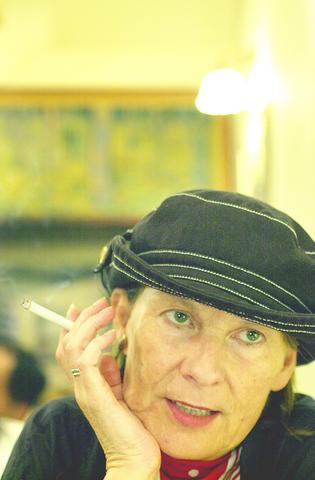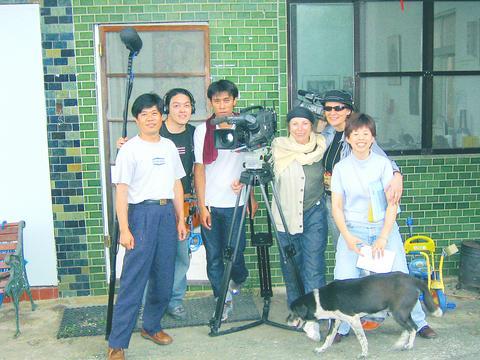Last month in Hamburg, a documentary film called The President's Belly -- recording the election campaign and post-election protests -- was shown to an audience of 200 people.
The film documented the emotional events and happenings, such as the 228 Hand-in-Hand human chain rally, the party concerts, the night after the shooting of Chen Shui-bian (
The film provides an on-the-spot documentary from an European point of view of that dramatic month, from Feb 28 to the end of March. What amazed the audience in Hamburg, as well as director Monika Treut herself, was the energy and passion Taiwanese people demonstrate toward politics.

PHOTO: SEAN CHAO, TAIPEI TIMES
One-and-half-years ago, Monika Treut, a distinguished German filmmaker known for her works challenging the limits of gender and sexuality, considered herself as an European. But now, she thinks of herself as being a little Taiwanese. When she talked to me at a cafe near National Taiwan University, she drank Taiwan beer, smoked Long Life cigarettes and carried a mobile phone with Taiwanese Aboriginal totems attached.
"For me, the most fascinating part of Taiwanese culture is the mixture of all cultural influences, the Portuguese, the Japanese, the US influences, and the political impact of the KMT in the past, and now people trying to find a new identity as Taiwanese," she said.
In September 2002, Treut was invited by organizers of the Women Make Waves Film and Video Festival (

PHOTO COURTESY OF PTS
"The people and their lives I've seen are wonderful and I've decided that I'd make a film about Taiwan," Treut said.
For Treut, the best way to illustrate Taiwan's unique quality is to mix the cultures and colors of life through telling stories of Taiwanese women.
In fact, The President's Belly is more like a prelude to Treut's feature-length film, temporarily titled Tiger Women Grow Wings.
The film marks the first German-Taiwan co-production venture, with Treut's Hyena Films, German Culture Ministry and Taiwan's Public Television Service (
The film, which she has just finished shooting, tells about the lives and stories of Taiwanese women from three generations. Three outstanding women, author Li Ang (
Treut refers to"Tiger Women" becauuse Taiwan is known as a "tiger economy." This, she said, also can refer to women's strength confronting hardships in life. The title is also a play-with-words on the Chinese idiom "like tigers grow wings" (
"In a way, growing wings means these women are free and independent from the traditional constrains," Treut said.
Making portraits of strong women has always been a motif of Treut's filmmaking. In the past Treut has made documentaries about dominatrix and actress Eva Norvind, provocative feminist professor Camille Paglia and human rights activist Yvonne Bezerra de Mello working in the slums of Rio de Janeiro. Now, it's the turn of three Taiwanese women.
Hsieh Yue-hsia, the 62 year-old Taiwanese opera actress and the winner of the 2002 Golden Bell Awards (Taiwan's answer to Emmy Awards), represents the senior generation of Taiwanese women going through economic hardships in the 1960s. The film crew traces Hsieh to her childhood as an adopted daughter forced to learn opera to make a living from the age of five. From the age of 16, Hsieh started to play male parts on stage and became popular among women fans. She is also the mother of four children.
Li Ang, one of Taiwan's leading authors about women in the 1980s, also deals with the themes of sexuality and the conflict between modern Western values and Confucian ethics. The film crew follows Li to her hometown Lukang (
Lastly the film focuses on DJ Chen, the first-time filmmaker of recent hit Formula 17 (
Having spent six weeks in Taiwan and having finished two films, Treut is now back in Hamburg to do post-production for the films. Asked what she missed most about working in Taiwan and with a Taiwanese team, she said it was the working style and ethics of Taiwan.
"The working ethic is very similar to that of old Germany. People here are devoted to work and very efficient. Of course, younger Germans are not like this anymore," she said.

April 14 to April 20 In March 1947, Sising Katadrepan urged the government to drop the “high mountain people” (高山族) designation for Indigenous Taiwanese and refer to them as “Taiwan people” (台灣族). He considered the term derogatory, arguing that it made them sound like animals. The Taiwan Provincial Government agreed to stop using the term, stating that Indigenous Taiwanese suffered all sorts of discrimination and oppression under the Japanese and were forced to live in the mountains as outsiders to society. Now, under the new regime, they would be seen as equals, thus they should be henceforth

Last week, the the National Immigration Agency (NIA) told the legislature that more than 10,000 naturalized Taiwanese citizens from the People’s Republic of China (PRC) risked having their citizenship revoked if they failed to provide proof that they had renounced their Chinese household registration within the next three months. Renunciation is required under the Act Governing Relations Between the People of the Taiwan Area and the Mainland Area (臺灣地區與大陸地區人民關係條例), as amended in 2004, though it was only a legal requirement after 2000. Prior to that, it had been only an administrative requirement since the Nationality Act (國籍法) was established in

With over 80 works on display, this is Louise Bourgeois’ first solo show in Taiwan. Visitors are invited to traverse her world of love and hate, vengeance and acceptance, trauma and reconciliation. Dominating the entrance, the nine-foot-tall Crouching Spider (2003) greets visitors. The creature looms behind the glass facade, symbolic protector and gatekeeper to the intimate journey ahead. Bourgeois, best known for her giant spider sculptures, is one of the most influential artist of the twentieth century. Blending vulnerability and defiance through themes of sexuality, trauma and identity, her work reshaped the landscape of contemporary art with fearless honesty. “People are influenced by

The remains of this Japanese-era trail designed to protect the camphor industry make for a scenic day-hike, a fascinating overnight hike or a challenging multi-day adventure Maolin District (茂林) in Kaohsiung is well known for beautiful roadside scenery, waterfalls, the annual butterfly migration and indigenous culture. A lesser known but worthwhile destination here lies along the very top of the valley: the Liugui Security Path (六龜警備道). This relic of the Japanese era once isolated the Maolin valley from the outside world but now serves to draw tourists in. The path originally ran for about 50km, but not all of this trail is still easily walkable. The nicest section for a simple day hike is the heavily trafficked southern section above Maolin and Wanshan (萬山) villages. Remains of